
STUDENT CONSERVATION ASSOCIATION | Lidia Soto leads the effort to motivate young people to join the environmental cause. (Photo/Press ALEF)
THE EXECUTIVE PRESIDENT OF THE STUDENT CONSERVATION ASSOCIATION (SCA) IS A PANELIST AT THE TREE EQUITY SUMMIT OF THE XIII AMERICAS LATINO ECO FESTIVAL (ALEF).
Newsroom El Comercio de Colorado
Haga click aquí para leer la versión en español
In the XIII edition of the Americas Latino Eco Festival (ALEF), which will take place in Denver in the coming days, the prominent participation of Lidia Soto-Harmon, executive president of the Student Conservation Association (SCA), is expected. This organization mobilizes young people to contribute to environmental causes. In 2023, under Soto-Harmon’s leadership, the SCA managed to have 2,000 young people between the ages of 14 and 28 donate a million hours to mitigate the effects of climate change and support other environmental causes.
The SCA is recruiting and training young firefighters, especially from underrepresented groups such as Hispanics, African Americans, and women. Additionally, the SCA received a significant grant to increase tree coverage in five areas of the United States. “We are focused on improving tree canopy in communities that need it. It’s not just about planting trees, but also about maintaining them over time. This is work that requires dedication and education for the community.”
Soto-Harmon, who will be one of the panelists at the Tree Equity Summit during ALEF, hopes to engage in meaningful conversations about the role of Hispanics in the environmental crisis and the importance of promoting environmental culture from childhood. “I believe it is important to educate the new generations and provide them with the tools to generate positive changes in the ecosystem. We are excited to be able to share insights with people concerned about the environment,” she concluded.
Interview with Lidia Soto-Harmon
Jesús Sánchez Meleán: Today we are talking with Lidia Soto-Harmon. She is a first-generation American. She is a proud Hispanic of Cuban parents, but she spent part of her life in Ecuador and El Salvador. We are going to talk to her because she will be here in a few days at the Americas Latino Eco Festival (ALEF), in what will be a summit on equity in access to trees and green areas.
Lidia has a very important voice at this event and in everything related to tree equity and access to green areas, because she is in an organization called the Student Conservation Association (SCA). That organization she leads managed to donate 1 million hours of work by young students to the United States in 2023. That million man-hours were used to help with conservation and environmental tasks.
The SCA managed to have 2,000 students join that day in different and multiple tasks to minimize the impact of climate change. Therefore, Lidia, welcome, and let’s start at the beginning.
What are your expectations before arriving in Denver for the Tree Equity Summit?
Lidia Soto-Harmon: I think it’s amazing that I’m going to be in Denver for this important summit. One of the things that pleases me a lot is that I believe that Hispanics, and I am Latin American, so to speak, raised during the most critical years, the years of childhood and adolescence, in Latin America, are part of the solution we have in the environmental crisis. So this summit, being with Irene Vilar, organizer of the event, and being with others who have a very genuine and intense concern to see how we can make a change to our planet. I am excited about the conversations that I hope to have with the participants in the summit.
JSM: We recently saw that your organization signed an agreement with the US Forest Service to train young people in fire management, which is already a recurring phenomenon throughout the year. There are not only fires in the summer, with more intense heat. There are fires at all times of the year, in most regions of the United States.
What do you think is the fundamental environmental problem that needs attention in North America right now?
LSH: Forest fires are one of those problems. It is a crisis that we are seeing more and more, and the Student Conservation Association, which could be roughly translated as the Youth Conservation Association, is dedicated to trying to help train firefighters because one of the tasks is to bring more Latinos, more African Americans, more women into an industry in which those groups were not always welcome. People who are different from those in that industry have not always been welcomed.
Another issue is how we can improve tree canopy in cities where we have many communities that need it because they are hotter than the rest of the city. And that can happen in Houston, Washington, or Denver. So it’s not just about planting trees, because that’s important, but even more important is to maintain the trees that have been planted. It takes 234 years to water them, fertilize them, and watch over them so they don’t die. That is the only way we will be able to change the tree canopy in communities that have that need.
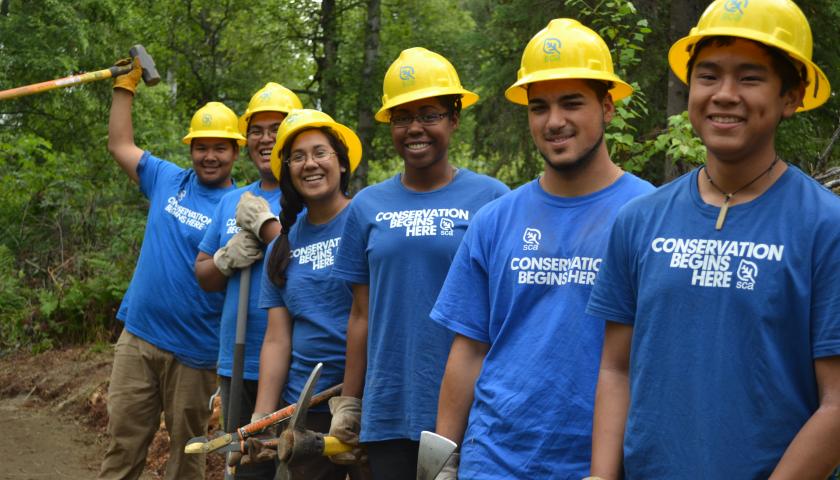
INCORPORATING MINORITIES | Forming a new generation of firefighters in the US. (Photo/Press ALEF)
We are also seeing in the Gulf of Mexico, and in places where there are swamps or wetlands, that we need to plant native species. Many times what we are seeing and what the SCA is seeing is that we have to educate the community to know that some species are invasive in the surroundings of those swamps and that this has a very negative cycle for everything. If invasive species are in a community, then it means that the birds don’t come. It means that the insects don’t come, it means that the larger animals don’t come, it means that little by little the ecosystem of that community is destroyed.
So that task of how we can help young people, whether they are university students or between the ages of 14 and 28, who are the leaders. They are not the leaders of the future, they are the leaders now. The challenge is how can we inspire them and provide them with the tools to make changes in the ecosystem of our country and the rest of the world. Because the clouds don’t know where the borders are. The clouds go from one country to another, they go from one ocean to another. In the United States, we have to worry about the environment, especially this month that we are celebrating, the planet. We have to worry about the whole world and what that means for us.
Lidia Soto-Harmon: “Hispanics are part of the solution to the environmental crisis in the US”
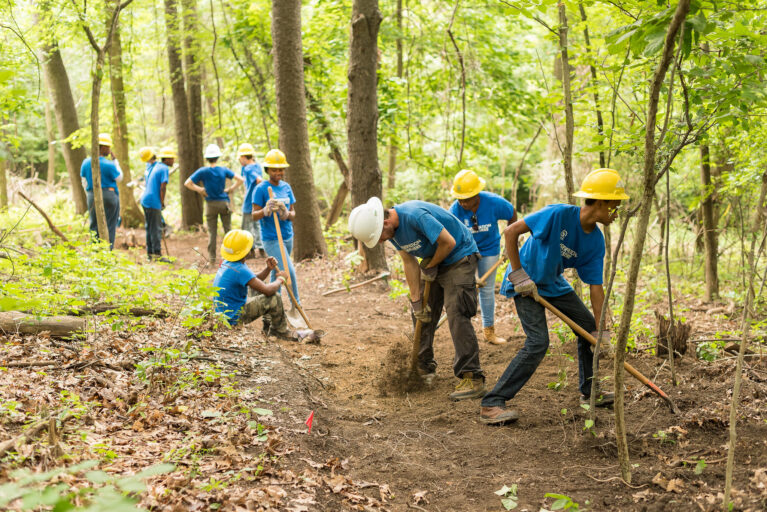
SUMMONED BY THE SCA | About two thousand students, under the age of 28, worked on fire risk mitigation. (Photo/Press ALEF)
JSM: You just mentioned that effort by the state in North America to use resources from the Inflation Reduction Act (IRA) to plant several million trees. Your organization is linked to that initiative. Tell us what will happen in the United States in the coming years in terms of improving that tree canopy, the one that is seen from a plane, when you see the amount of green versus the areas where there is none. The neighborhoods with the most tree canopy are the most affluent.
What is being done in the United States in terms of changing that situation and creating tree equity and also contributing to climate reduction?
LSH: At the Student Conservation Association, we are extremely honored to be one of the ten nationally nonprofit organizations chosen by the US Forest Service to improve equity in green areas. We obtained a grant that we will use for the next five years in five communities throughout the United States. We are going to promote the “Urban Green” program to create green areas in cities.
We know that there is a great need for trees in parks and forested areas. But the truth is that it starts with the community. We are going to do something similar to what is happening in Denver. We are going to involve youth who are so involved in promoting the sanitation of our country in environmental issues.
We are going home by home. Talking to residents and helping those residents let us plant trees in their yards because we know that is one of the ways we will be able to change it. Unfortunately, there is a lot of pavement in these communities that we are looking for equity in and we have to start by trying to change that tree canopy.
We are going to plant trees in places that are private. It is a harder job because a person, a family, does not quite understand the problem. They think that a tree is then something that they have to worry about because if it grows too fast, it can fall on top of the house. If it is a fruit tree, it can drop a lot of fruit that they cannot pick up later. It is a matter that is not so easy. One would say that every person wants a tree in their yard. But it is not so easy to achieve it. So we need to have education so that these people agree. I believe that the Inflation Reduction Act and the money being given for these projects will fundamentally change the environment of our country, especially in those communities where there is so much need.
Lidia Soto-Harmon: “Hispanics are part of the solution to the environmental crisis in the US”
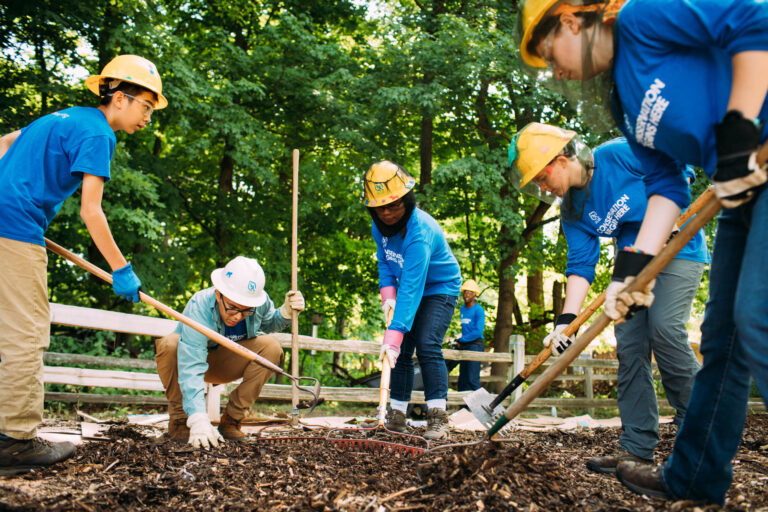
IRA RESOURCES | The SCA is advancing the “Urban Green” program by planting trees in American homes. (Photo/Press ALEF)
JSM: There is another facet of yours that is very important. You were involved in producing or disseminating books for children. Also, as a mother, you have managed to make your children bilingual.
How do we link that idea of forming environmental culture with the idea of reading and the book? What linkage is there and how? What recommendation or guidance do you give to parents to create children who are friends of the environment and who also cultivate that heritage of the Spanish language?
LSH: Every time I talk to moms or dads of children who are Latino and I hear them speaking English to their children, I tell them to speak Spanish because we all know that a person who masters two languages has many more opportunities in the world. Because they can translate for another person, they can help people in need, they can get jobs that they might not get if they were a monolingual person.
I think one of the things that I am very proud of my children, who are already grown up and who still love their Spanish, their language, is that it also gives you a feeling of cultural identity. Language is not only being able to speak, but also appreciating all the cultural issues that exist.
And one of the things that we sometimes forget when we talk about the environment is that many of the indigenous people and the people who lived in the Americas from the beginning, before colonization, protected the environment. They knew how to hunt, but not destroy everything. They knew how to use plants that were healing. There is a lot to learn about the cultural heritage that we have from the indigenous people who were here in the Americas.
Lidia Soto-Harmon: “Hispanics are part of the solution to the environmental crisis in the US”
It is something that we cannot leave for later, but we have to instill it from a young age and of course, books are one of the most beautiful parts of the education that can be given to a child. It is giving them books in their language, with children who look like them, and a mother or a father, or an uncle or a godmother who can pick up that child and sit them on their lap and read them a book out loud.
What we found at First Book is that it is a bond between that adult and that child where the adult is 100% dedicated to the attention of that girl or that boy, which is so important because that is how self-esteem is created in children so that they can later fight and can change the world, which is what we want for all children.
JSM: You have already heard her. Lydia Soto Harmon will be in Denver at the Tree Equity Summit as part of the Americas Latino Eco Festival this week, April 11th. Lydia, thank you very much. We will follow you, we will shake your hand, and thank you for coming and sharing all these visions, also full of pride for the Hispanic community, because you play an important strategic role for change in society and you are proud of your roots. And also, you speak Spanish. Thank you very much, Lydia.
LSH: Well, thank you, Jesus. Thank you very much. See you later. See you Wednesday when I arrive. Bye.
Lidia Soto-Harmon: “Hispanics are part of the solution to the environmental crisis in the US”
You may also like:
Urban forests represent a solution for a healthy and sustainable life
International Exhibition “The Giving Tree”, an “artivist” tribute to nature
Gil Peñalosa: “The Lack of Equity in Green Spaces is Unacceptable”




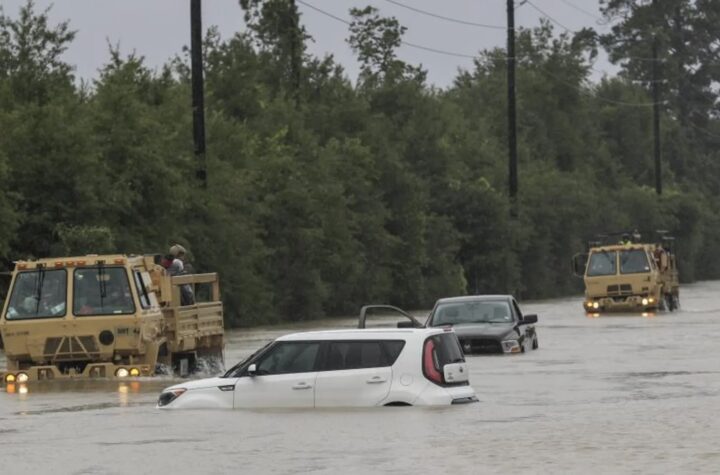
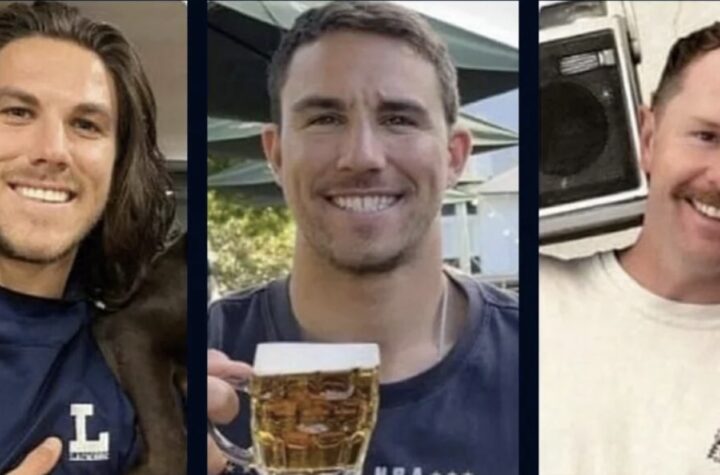
otras noticias
Digital Calendar – May 2024
COVID-19 Affected Individuals Live with its Effects
The gorillas of AMLO